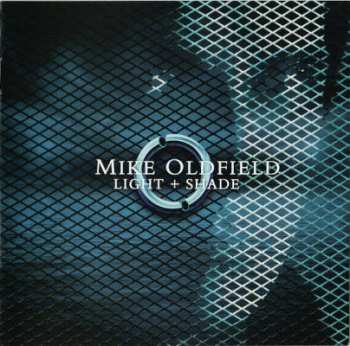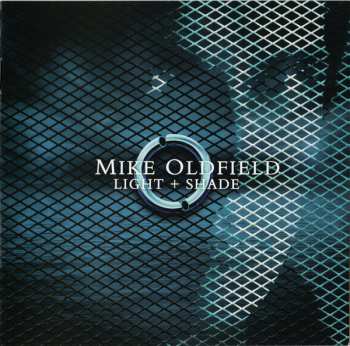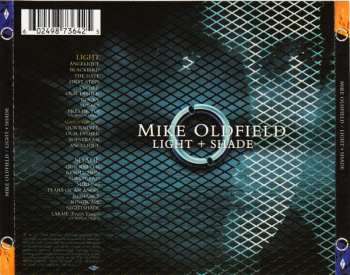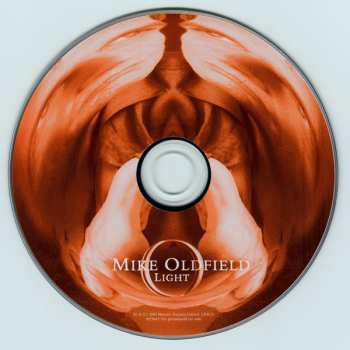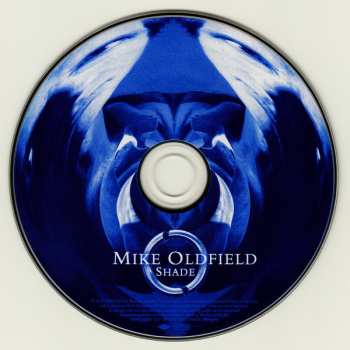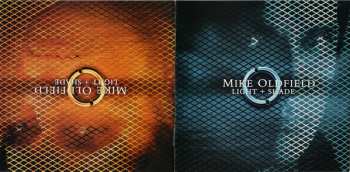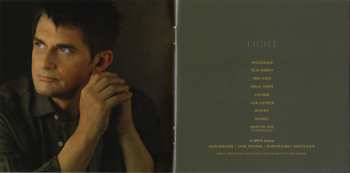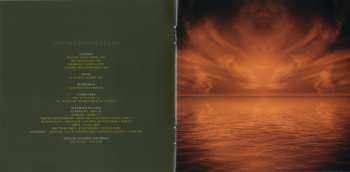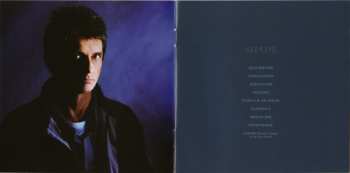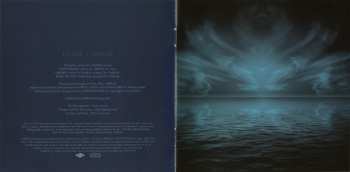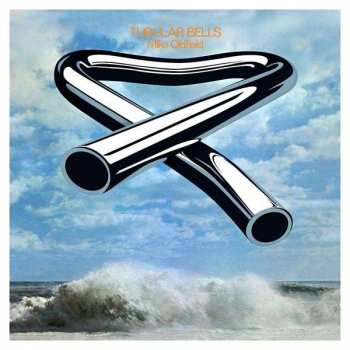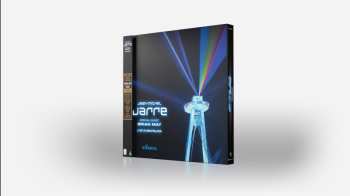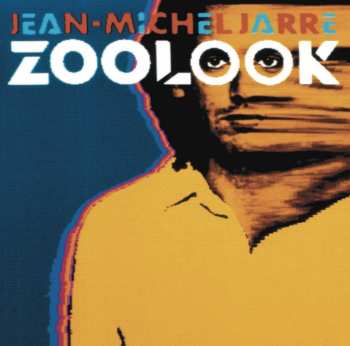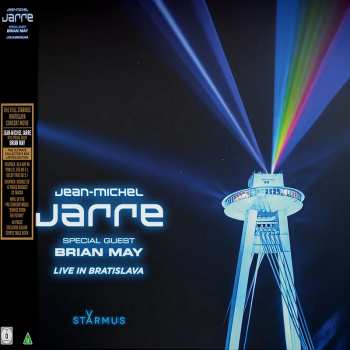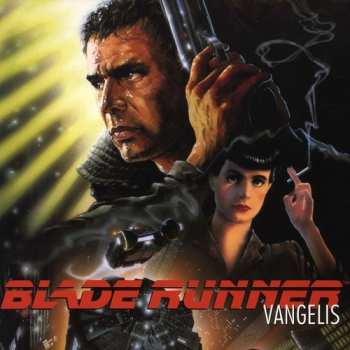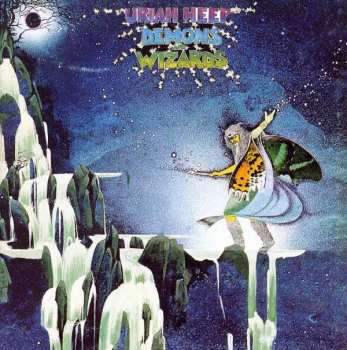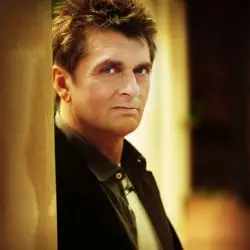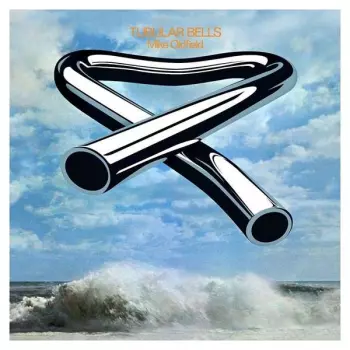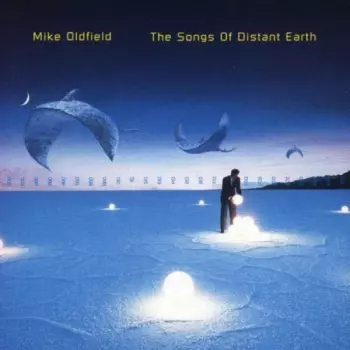"That's exactly the problem," moans Mike Oldfield. "I just don't fit into any of the usual boxes." The man behind the Tubular Bells album - the phenomenon that turned him from a teenage prodigy into a one-man revolution - is still proud and defiant, and to this day he doesn't get distracted. Whether he was creating twisted pop, boundary-crossing...
Estado
Nuevo
Disponibilidad
Precio
12,29 €
Disponibilidad
Detalles
| Título | Light + Shade |
| Artista | Mike Oldfield |
| Formato | 2x CD |
| Editorial | Mercury |
| País de edición | Reino Unido |
| Fecha de edición | 11. octubre 2021 |
| Lanzado por primera vez | 2005 |
| Peso | 400 g |
| EAN | 0602498736425 |
| ID del producto | 20422 |
| Discogs ID | 600073 |
| Reseñas en Discogs |
3.74
|
"That's exactly the problem," moans Mike Oldfield. "I just don't fit into any of the usual boxes." The man behind the Tubular Bells album - the phenomenon that turned him from a teenage prodigy into a one-man revolution - is still proud and defiant, and to this day he doesn't get distracted. Whether he was creating twisted pop, boundary-crossing rock, progressively serene or orchestral sonic manoeuvres, he was adopting Celtic or African sounds (before those musical styles fell out of favour), designing worthy chill-out worlds or virtual reality games represented on the net (with accompanying music, of course), or his music for the horror classic "The Exorcist" or the soundtrack to the movie "Killing Fields" - you could always clearly hear what a unique talent Mike Oldfield is. More accurately, he doesn't even call himself a musician. "I'm more of a technician who turns my ideas into sounds." But what to call this sound? That even a fan wouldn't be so wrong as to write "Oldfield Progressive" in the definition he left online? These days, a double-album is about to be released - "Light" on one side, featuring his ambient/chill-out cerebral half (though Oldfield hates such pigeonholing!). The other side presents a darker and heavier counterpart in the form of "Shade". "Those are the two sides of my musical personality." Together, the two halves are an addictive mix of simple (set) pieces and breathtaking complexity. Occasionally, Oldfield sticks close to electronic dance music ("Quicksilver," "Slipstream," "Romance"), then presents a touch of blues ("Closer"), but he explores even more stylistic excursions on tracks like "The Gate," with its eerie tinge of melancholy, and "Tears Of An Angel," which has everything from minimalism to guitar overdrive (even African vibes). While a track like the ten-minute "First Steps" may not seem too easy to digest, "Light + Shade" is a fairly accessible Oldfield album. It will always provide you with new starting points, new impressions (in this respect, the album is in some ways comparable to his computer game works). But when you ask Oldfield where and how he would place this new work in his 23-year solo career (with a proud 22 albums to his credit), you again don't get much more than a sigh: "I'll just start and then see where I get to," is his reply. "I've said it many times, but I feel more like a filter. Inspiration comes from deep within. I have to work damn hard to get it out every time, but luckily I've had enough experience so I know when it works: when I make music, it usually doesn't. But once the inspiration infects me, it all goes by itself." "Light And Shade" comes after a three-year period where Oldfield worked exclusively on two virtual reality games, "Tres Lunas" (2001) and "Maestro" (2003). Until one day I realized that I had to throw myself into music again. When you have a completely blank slate in front of you, it's usually best to look around a bit. Then when I realised how much the technical possibilities had changed in those three years, I also realised that my studio had finally become useless. Suddenly I could do everything with the computer, it was enough. So I had a truck and eight guys come in and clear everything out..... I wasn't even worried, I was more curious to see what would fill the new vacancy. It's amazing what you can do these days. You imagine something and then with just a few clicks of the mouse and - bingo - you have the desired result! Done!" Sure - this man is used to working alone. Back in 1971, when he was working on the demos for the magnificent 'Tubular Bells' album (which has sold 16 million copies to date), Mike was struggling to cope in his Tottenham flat. At the time he was still working on equipment borrowed from former Soft Machine founder Kevin Ayers. Mike had previously played in his backing trio, The Whole World, as a 16-year-old guitar virtuoso before embarking on his own, then still folk projects. With his new album, he found himself in a similar situation again: he was also recording 'Light And Shade' at home, in Chalfont St. Giles, Buckinghamshire, albeit 'in' (or on) a contemporary version of a home studio - namely his computer, which he equipped with FL Studio software, better known as Fruity Loops. "The frames of each track are programmed. But I have a guitar sound, actually several guitar sounds, so I wanted to use guitar in almost all the tracks. I even played the piano myself on a few tracks - although I'm a pretty lousy piano player." Mike originally planned a different type of album, "I wanted to make a big album, an elaborate album that sounded a bit like my early work, like 'Tubular Bells', which ended up having about 30 or 40 parts as well. It was going to be a bit like Monty Python - "Now something completely different!", from beautiful to crazy and back again. But that way of working would have linked the album too much to the seventies, and I didn't want that either. That's when I heard the compilation album Buddha Bar in Paris, where their double CD was split into two parts, "Dinner" and "Party", with two different genres on the two CDs. Even though I didn't like the music in Buddha Bar at all, I knew I definitely wanted to start something comparable." However, if you start looking for a deeper insight into the person behind the music, you run into further difficulties. "I can't put my work into words, that's what I do music for." And when he uses a few words, there's a problem. And yet, you can bet that those who love "Tubular Bells" - whether in the original or in any of its follow-ups, "Tubular Bells II" (1992), "Tubular Bells III" (1998) or on the 30th anniversary album, "Tubular Bells 2003" - will surely think of this music the same way its author does: "such a Monty Python like symphony." Mike adds that "there has never been anything like this album". He evolved, and he evolved without any influences other than his own muse. He always stayed true to his muse, no matter what changes the music world went through - for example, after several great albums he released as a songwriter and multi-instrumentalist, he was simply washed away by the punk wave: "In the case of punk, I felt like nobody really knew what to do anymore. That's why they broke everything. I thought it was all pretty artless, a disaster." Mike goes even further: he says Punk indirectly led to a lot of arguments: "After all, you can be sure that those who beat up others in the street are more likely to cite Johnny Rotten as their idol. They would never take my name in their mouth when it comes to idols." He also admits today that he had trouble getting back into the limelight at the time. He found it hard to perform live: "At that time I was really mentally broken, insecure, I was mentally quite confused. I was having panic attacks and paranoid fits - it took me 20 years of psychotherapy to get over that. It's only now that I've regained the strength and personality to stand up and prove myself as well." As his confidence grew and his personal and artistic matters continued to merge, Mike decided to introduce his new work gradually. This is what it sounds like when Mike Oldfield explains "Light And Shade" in detail... "LIGHT""Angelique""That's the name of one of the presets on one of my synths. As always, I started building the music from the bottom up and this track sounded kind of angelic. I can't say how it happened, I just pressed a few buttons. I usually come out of the studio every three days and have a new track ready to go. Then I'm done for the moment. It always feels like a birth.""Blackbird" I wanted to make a piece for piano only and use my last real instrument: a 1928 Steinway. I borrowed the title from one of my motorbikes because I have a whole garage of fast machines. Among them is a Honda Blackbird. The piece is slower, but it's more reminiscent of the way Stanley Kubrick worked with music in the movie "2001": when you're driving, time seems to slow down at the same time, as if it's in slow motion. I like to spend time with my musical machines, but then I also need to relax again and disappear on my fast motorbikes. I've also tried airplanes, even got my pilot's license, but it was too exhausting for me. Motorcycles are just so much more relaxed." "The Gate""I worked on this track with this vocal software: Vocaloid. You take a very raw, unedited sound, run it through some plug-ins, and it sounds beautiful. The song was written by my grandfather Michael Liston from Cork. I knew he disappeared one night and didn't come back until three years later, but then I found out he actually fought in the First World War at Ypres in France, where a memorial was later erected. Go to Ypres and check out the museum - then you'll be in exactly the mood this song is in.""First Steps" "This is a compilation of songs I made for my play 'Tres Lunas'. At the beginning of the game you are alone in the desert, standing in front of a cactus, and when you start walking, the music starts. My friend Robin Smith, the keyboard player, helped me with the arrangement of the song.""Closer""During a trip to Ypres, I heard the anthem and found out it was Pres De Trois. I liked the song so much that I even made a Celtic version of it. But the heavy bagpipe tunes didn't fit the record, so I did a blues version.""Our Father" "It was originally a tune from 'Tres Lunas'. I changed the original version when the Pope was dying, so all the fascination with his life came into the song. When he finally died, I didn't feel he was dead anymore because thematically I was still very consciously with him. For me, this song represents his whole life and also his death.""Rocky" "That's the name of my horse. He's an Arabian stallion who always comes up to me and wants to hug me. If we didn't have him with us one day, I'm sure he'd be an incredible beast." "Sunset" "In 'Maestro', the second game I made, there's a very special melody that you can only hear when you get to the last level. In the case of 'Sunset' I created a variation of the same tune, but I had in mind that it should be a chill-out number. Hence the title, "Sunset". ""SHADE""Quicksilver""I don't think this song is dance music. Maybe music with a dance beat. I tried to follow the underwater movements on the track with dolphins and rising bubbles. When I lived in Ibiza I often saw dolphins behind the boats - it was really impressive.""Resolution""Where I live - in Chalfont St Giles - there is a monument to Captain Cook. I love travelling and Captain Kirk was based on Captain Cook, whose ship was also called the Resolution. He went to Antarctica on that ship. So I created music that sounds like ice. But then when I was recording, everything went wrong during the Iraq war, so different elements came together.""Slipstream" "I asked FL Studios if I could work with one of the demo tracks from their Fruity Loops software, because I was really excited about the riff. They immediately agreed and that riff eventually became 'Slipstream'." "Surfing" "I put a virtual vocal part from the 'Cantor' software on my own vocal part - along with the robot sounds, this track was the result." "Tears Of An Angel" "My daughter Molly was very sad at the time. I was working with the Vocaloid program at the time. The fake voices combined with my own to create a nice thick chorale effect.""Romance""The first thing beginners learn when playing Spanish guitar is that there are two sounds - one major and one minor. I really wanted to do a dance version, but the main one didn't really work. So I stuck to the dark side of the novel. Maybe you should imagine a love story that goes completely to hell, so both parties get lawyers on their side and then have a big fight.""Ringscape""Another piece from ´Tres Lunas´. It is from this passage that the owl takes you on a journey. Across the desert, into a tunnel and then into the world of ice picks. Once again, Robin Smith helped me with this.""Night Shadow""Christopher von Deylen and I agreed that each of us would help with one piece. So now I'm playing guitar in a song by his band Schiller and he helped me with bass and drums in this song. Apart from Robin Smith, Christopher is the only guest on the album. Everything else is up to me." Product Information Light + Shade, released in 2005, is a double album consisting of two very different parts. Mike Oldfield is heavily influenced by the chill-out albums in the style of Ibiza's Cafe del Mar, and follows this model to create one album full of atmosphere and the other a much darker and more exciting experience.
Álbum abarca todos los géneros Música electrónica, Ambient y Trance.
Nuestra opiniónes:
ES Tasa de envío a partir de 9,96 €
¡Aquí encontrará de todo!
En
185 000
LP y
311 000
CD
en oferta
Descuento de fidelidad de hasta 5%
Para clientes registrados
¡Siga al tanto!
El seguimiento más avanzado
de disponibilidad y pedidos
